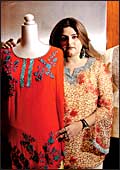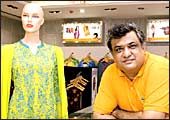 |
 |
SHEETAL'S PRIYA AMIRI: About 7 to 8
per cent of the store's revenues come from some form of Bollywood-inspired
merchandise like
this set |
BIBA'S SANJAY BINDRA:
An outfit worn by Esha Deol
in the movie Na Tum Jaano
Na Hum and marketed by
Biba sold 40,000 pieces
for Rs 12 crore |
At
south Mumbai's upscale retail store, Amarsons, a small black and
white printout pasted on the shop window foregrounds mannequins
adorned in ethnic wear. The notice simply says, 'Bunty Aur Babli
Suit'. Walk in and ask for the item in question and the sales
staff show you a range of 'suit pieces' patterned on the shirt-style
tunic worn by Bollywood actress Rani Mukherjee in the latest flick
from the Yashraj Films' stable, Bunty Aur Babli. Move into the
neighbouring store, Premsons, and you are told that the 'Bunty
Aur Babli' range of outfits has been sold out, and the next batch
is expected in a month's time. The last one available, for Rs
2,195, has to be bought off the mannequin.
Walk a little further down the road and at
Benzer, a premium store on Mumbai's upscale Bhulabhai Desai Road,
the sales staff pull out a pure silk version of the same outfit
priced at a cool Rs 10,900. The linen fabric variant of the 'Babli'
outfit is priced at Rs 5,500 a pop, and that's the lowest price
for the product at this store. As a shot in the dark, this reporter
asks for the 'Veer Zaara' outfit and pat comes the reply, "That's
only available in the party range priced Rs 15,000 onwards".
Now if you're wondering what the point of
this exercise is, well, simply put, it's a first-hand feel of
the burgeoning market for Bollywood-based merchandise. While no
reliable estimates are available as to the size of the movie-based
merchandise business, retail consultancy ksa-Technopak estimates
the market for ethnic wear such as sarees and salwar-suits at
Rs 12,000 crore a year. Even if 1 per cent of that market can
be tapped by the Bollywood merchandisers, that's Rs 120 crore
in additional business. Agrees Tarun Tripathi, head of marketing
at Yash Raj Films and an IIM Lucknow grad: "The market is
simply staring us in the face and we really need to start figuring
out how to address it."
Bollywood Dreaming
Some are already making their moves. Vipul
Shah, producer and director of the recently-released movie Waqt-which
stars, among others, Amitabh Bachchan-has taken his first steps
in merchandising through tie-ups with brands like Archies and
BIBA, an apparel brand with presence in about 130 locations across
the country. For an upfront investment of Rs 25 lakh, the Archies
brand was woven into the storyline with Amitabh Bachchan playing
the owner of Archies in the film. He also creates a toy (as part
of the story), Geri (a stuffed Giraffe), and stationery, which
now have been launched across 195 Archies outlets. Geri has done
roaring business, according to Anil Moolchandani, Chairman and
md of Archies. "We have sold 7,500 pieces priced between
Rs 399 and Rs 1,199 in three months," he claims. By comparison,
regular stuffed toys move at the rate of about 500 in three months,
Moolchandani notes.
| BOLLWOOD ON THE SHELVES: FIRST
STEPS |
| FILM |
MERCHANDISING MOVE |
| Waqt |
Tie-up with BIBA for apparel merchandise
and Archies for soft toys. (The latter deal involves an in-film
placement that has Bachchan playing the owner of Archies) |
| Paheli |
Tie-up with Titan's Tanishq jewellery.
Tanishq designed all the jewellery for the film and has launched
a 'paheli' range at its stores |
| Kya Kool Hai Hum |
Tie-up with Spykar jeans which
has launched a special product range for the film (the film's
title song also advertises the brand) |
| Baghban |
Tie-up with BIBA for apparel retail |
| Devdas |
Tie-up with Archies for stationery
merchandising and Planet M for a CD Rom with detailed info
on the film and visuals of the sets along with printable images/motifs,
apart from tie-up with BIBA for apparel retail |
Titan Industries, which struck a deal with
the Shah Rukh Khan-produced Paheli to design and retail jewellery
featured in the film as part of its Tanishq brand, also claims
to have done very well on the range priced between Rs 20,000 and
Rs 4 lakh. "It's been one of our best selling ranges this
year," says Harman Dhillon, Brand Manager for Tanishq. Priya
Amiri, Director of Strategic Planning at Sheetal, a high-end ethnic
wear retailer in Mumbai, couldn't agree more. Already, 7 to 8
per cent of the store's revenues come from some form of Bollywood-inspired
merchandise and she expects that trend to intensify in the future.
Sheetal has even done Bollywood-based fashion shows in Mumbai,
Dubai and San Diego, and plans one later this year in Malaysia.
Customers at the shows place their orders for the designer (Aki
Narula, Hemant Trivedi) suits, whose prices range from Rs 4,000
to Rs 40,000. Says Amiri: "Our shows have been a huge success
in terms of sales."
Even apparel manufacturers like BIBA, set
up nine years ago to supply merchandise to retailers across the
country, have managed to tap the mass market with movie-based
merchandise. BIBA has struck deals with a handful of film producers
over the last couple of years to reasonable success. One large
format retailer who had ventured into the movie merchandising
business with a movie production-Na Tum Jaano Na Hum, starring
Esha Deol in 2003-and followed it up by merchandising, is Kishore
Biyani of Pantaloon Retail. The chain subsequently discontinued
this line of business, but is now planning to revive it.
Sweet Spot? Not Entirely
| TV'S EARLY MERCHANDISER |
| MTV India has
been one of the early movers in entertainment-based merchandising
in India. Today, its merchandising business extends from apparel
and accessories to co-branded credit cards (Citibank), watches
(Titan) and even airtime (pre-paid cards with Airtel). It
all began with apparel and accessories four years ago when
the company opted for a licensing agreement with a garment
manufacturer. Early this year, that partnership saw the entry
of one more licensee and a new merchandising plan where 'MTV
Style' garments will get 100-150 sq feet in about 100 multi-brand
garment outlets across the country. "It's a conscious
decision not to be in very big stores, we need a better reach
and decided to go ground up," says Sanjev Hiremath, Sr
VP, Licensing and Merchandising (South Asia), MTV. Interestingly
enough, the company has entrusted its entire design, manufacturing,
distribution and retail functions to its licensees in the
garments business. "It's not a business we specialise
in, so it's best to go with a licensee," explains Hiremath.
He plans to extend that strategy to Nickelodeon, the children's
channel, where the first merchandising agreement has been
with Bombay Dyeing for use of Nickelodeon characters in bed
linen. |
Despite the apparent size of opportunity,
merchandising movie-based products isn't easy at all. The big
stumbling-block is the industry's unorganised nature. The first
question every producer is confronted with is, why should a retailer
pay for an apparel design when he can simply copy it? In fact,
that's what has been happening so far. Which is why, in-movie
placements for the retail brand become important. Therefore, doing
anything profitably means having a supply chain in place that
spans suppliers, distributors, and retailers. In the absence of
that, merchandisers find the going tough. Take BIBA, for example.
According to its Director, Sanjay Bindra, the company needs to
commit upto Rs 2 crore as spend on film promotions in return for
the rights to manufacture and sell apparel featured in the movie.
So to break even, he must make between Rs 2.5 crore and Rs 3 crore.
"The operating costs for me on Bollywood ventures are too
high," says Bindra.
The other issue is retail reach. Given that
the shelf life of a movie-based product is typically four to five
months, the merchandiser must sell as much as possible in that
short time. In some cases, the window of opportunity is even smaller-say,
15 days-because that's how long it takes copycats to get in. Says
Rupali Mehra, Director (Marketing & Alliances), Ad Vista,
a strategic consulting firm for film promotions and in-film advertising:
"You can't afford to stick with just large retailers with
limited presence in the market; the merchandise has to go out
to the smallest retailer." BIBA's Bindra is evening considering
rolling out his own stores (80 over the next three years) to corner
the retailer margin of 35 per cent on MRP.
Finally, producers and merchandisers will
need transparency in the supply chain if the business is to grow.
Producers would need to know if they are getting the right sales
figures on merchandise, since royalties are tied to that. Says
Shah: "Merchandising will also help mitigate the overall
risk of the film business." Adds Tripathi. of Yashraj Films:
"(Merchandising) is a business we don't understand at the
moment, but we have definitely started getting a blueprint together."
After all, the rewards are too big to ignore.
|





